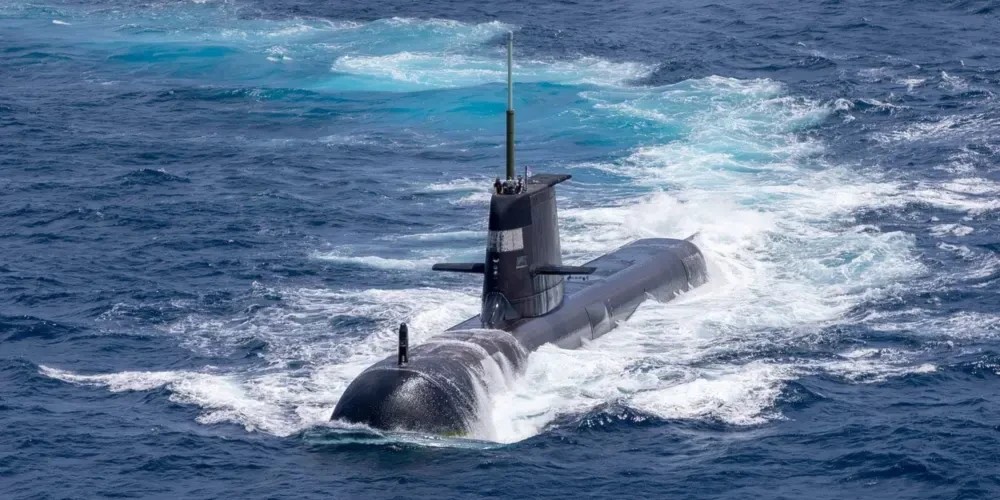Australia: AI to be used to detect Chinese subs as part of AUKUS
Australia's Defense Minister, Richard Marles, has joined counterparts from the United States and the United Kingdom, Lloyd J Austin, and Grant Shapps, to unveil the second component of the AUKUS agreement.
-

Royal Australian Navy Collins-class submarine HMAS Rankin, north of Darwin during an exercise, September 5, 2021. (Royal Australian Navy)
Australia, along with its AUKUS allies, plans to utilize advanced technologies such as artificial intelligence, drones, and deep space radar to address "China's assertiveness in the Pacific."
During a meeting in California, Australia's Defense Minister, Richard Marles, joined counterparts from the United States and the United Kingdom, Lloyd J Austin, and Grant Shapps, to unveil the second component of the Aukus agreement.
This development follows Australian Prime Minister Anthony Albanese's recent criticism of a Chinese naval ship's alleged provocative actions.
On Saturday, Marles expressed that the incident was deemed "unsafe and unprofessional" and had been directly addressed with China. He emphasized that their concerns about the behavior had been publicly communicated. "We have made public our concerns about the behavior," he said.
Dive deeper
While the focus has predominantly centered on Australia's planned acquisition of nuclear-powered submarines within the AUKUS pact, the second pillar emphasizes advanced technologies.
Artificial intelligence (AI) will reportedly play a key role in processing information from sonobuoys on systems, like the P-8A Poseidon aircraft, enhancing anti-submarine warfare capabilities.
AI algorithms and machine learning will further contribute to improving force protection, precision targeting, and intelligence, surveillance, and reconnaissance.
Additionally, submarines, both existing and future, will be utilized for launching and recovering undersea vehicles through torpedo tubes.
In further detail, quantum technology will be deployed to enhance positioning, navigation, and timing, improving stealth and enabling operations even in the absence of GPS signals.
AUKUS should be abandoned if Trump re-elected
The UK, US and Australia declared their commitment to conducting a series of coordinated trilateral experiments and exercises to evaluate and enhance the functioning of unmanned maritime systems. They will collaborate on sharing and analyzing maritime data, strengthening cybersecurity measures, and initiating an annual competition centered around electronic warfare technologies.
In their collective statement, they reiterated a "shared resolve to bolster security and stability and ensure that the Indo-Pacific remains a region free from coercion and aggression".
Marles rejected worries that the potential reemergence of Donald Trump in the White House could jeopardize Aukus, asserting that the agreement enjoys backing from various political perspectives. A survey revealed that approximately 40% of Australians believe the government should abandon the Aukus deal if Trump is re-elected.
Austin emphasized that AUKUS aims to enhance peace and security across the Indo-Pacific, a sentiment echoed by Shapps, who indicated that the region has become notably more perilous.
According to the joint statement, six officers from the Royal Australian Navy have completed their training at the US Nuclear Power School, and three more are scheduled to graduate from the UK Nuclear Power School in January. Professionals from the industry have commenced their work at the US Pearl Harbor Navy and the UK Barrow-in-Furness shipyards, focusing on acquiring the expertise needed for the construction and maintenance of nuclear-powered submarines.
The AUKUS partners also alleged their dedication to nuclear non-proliferation and have expressed support for "Australia's choice to establish an independent nuclear safety regulator".
Read next: China miles ahead of AUKUS, allies in sensor technology: Think tank

 3 Min Read
3 Min Read








